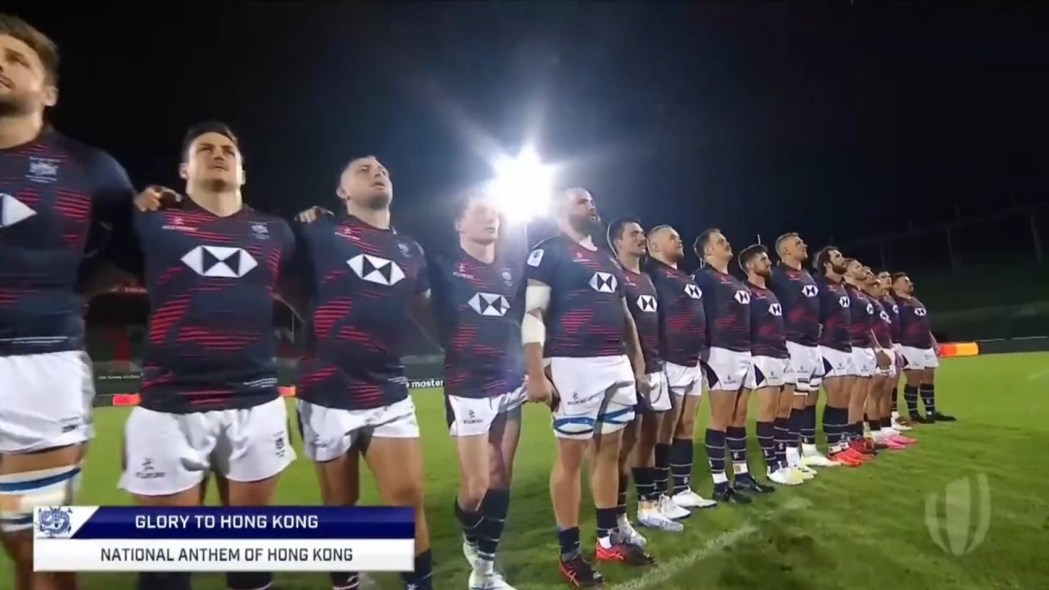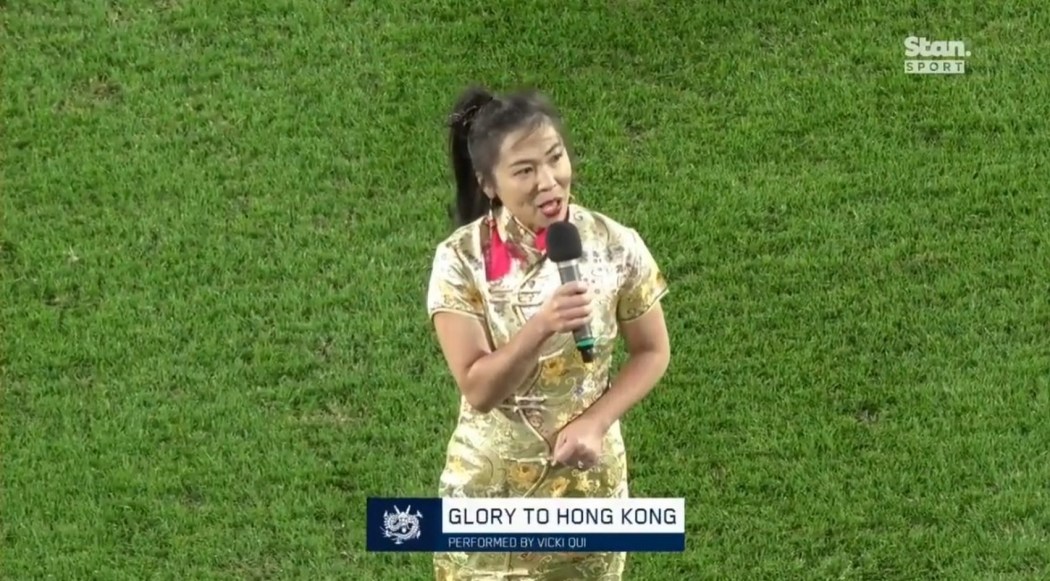The Hong Kong Rugby Union (HKRU) has expressed “extreme dissatisfaction” with World Rugby after the Chinese national anthem was twice mislabelled as a song linked to the 2019 extradition bill protests at two World Cup qualifiers.
During a televised broadcast of a match between Hong Kong and Portugal at the Final Qualification Tournament on November 6, the city’s national anthem – which it shares with China – was captioned as “Glory to Hong Kong” rather than “March of the Volunteers,” landing city’s rugby team in yet more controversy relating to the Chinese national anthem.

No one from the Hong Kong team or its management was aware of the blunder until after the match, HKRU said in a statement issued on Saturday. The event organiser also did not ask to be given the name of the anthem, nor informed anyone that the name would be displayed in the televised footage, HKFU said.
World Rugby apologised to HKRU after the issue was raised, and explained it was “an error of the graphics operator,” according to HKRU’s statement. Attempts were made to “retroactively correct” the erroneous caption on World Rugby’s on-demand stream and other released footage, HKRU said.
In an update to Saturday’s statement, the local rugby group said the same error was made at another qualification match for the 2023 Rugby World Cup on July 23, when a singer performed the “March of the Volunteers” on the field before Hong Kong played against Tonga. Footage showed the title of the song as “Glory to Hong Kong.”
HKRU requested a formal apology from the international governing body of rugby to the Hong Kong government and its people, saying it regretted any damage to the city’s reputation from mistakes made by the regional and global rugby bodies.
“Playing or labelling the national anthem of China incorrectly is both disrespectful and hurtful to the people of Hong Kong and the nation, and the HKRU has again expressed its extreme dissatisfaction with World Rugby for this serious error,” the statement read.

Released in September 2019, “Glory to Hong Kong” was a popular tune among protesters during the months-long citywide unrest sparked by a since-axed amendment to the extradition bill. Large-scale demonstrations often descended into violent clashes between police and protesters, and the movement later morphed into wider pro-democracy calls.
The authorities have described the song as being closely associated with “black-clad violence,” saying it advocated for Hong Kong independence. Although the protests attracted some pro-independence activists, secession was not one of the movement’s demands.
While the government has not explicitly declared the song illegal, it is banned in schools and a busker who performed it last year was arrested by police for “public disorder.”
‘Inconceivable’
On Sunday, Hong Kong’s number two official Eric Chan described the blunders as “ridiculous” and “inconceivable,” saying the government would write to World Rugby and Asia Rugby to express “strong discontent” and demand a probe.
It was “incomprehensible” for experienced organisers to allow the blunders to take place, he said, adding that the police would launch an investigation to determine wither any “criminal elements” were involved in the incidents.
“How could this happen again and again?” Chan told reporters at the Community Chest New Territories Walk for Millions. “Regarding these explanations, we think it is hard to believe.”

The latest national anthem blunder came days after the pro-democracy protest song was played at South Korea’s Rugby Sevens on November 13 instead of the Chinese national anthem.
The mix-up triggered a chorus of criticism and complaints from the city’s leader, top officials and pro-Beijing figures, with Chief Executive John Lee calling it “unacceptable.” The Hong Kong police also launched an investigation into the incident.
Pro-Beijing lawmakers dismissed explanations that the incident stemmed from a “simple human error” by an intern. Some urged the city’s national security police to step in over alleged elements of “foreign collusion,” while others suspected it was a deliberate move to “offend Chinese people.”
Legislator Junius Ho also called for the “disbandment” of the Hong Kong rugby team over their “lack of response” when they heard the protest song being played.
Support HKFP | Policies & Ethics | Error/typo? | Contact Us | Newsletter | Transparency & Annual Report | Apps
Help safeguard press freedom & keep HKFP free for all readers by supporting our team
























